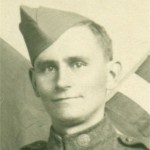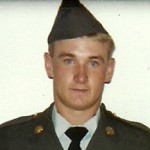marching
 When we think of war, we usually think of planes and tanks, bombs and guns, but lately I have been wondering just what the life of a foot soldier was like. My grandfather served in World War I, and after reading a little bit about what it was like for the men in the trenches, I find myself feeling very thankful that my grandfather was a cook. I don’t know how he got that position, considering that so many soldiers were needed, and the number needed grew daily, or even hourly, I just don’t know how he was so blessed to be a cook. Grandpa Byer was always such a gentle, soft hearted man, so I have a really hard time imagining him in a position of having to kill someone. I read that when new foot soldiers came to the front, many lost their lives on the first day, because they got into the trenches, and got an overwhelming urge to peek out over the top to see if the enemy was coming. The instant they peeked over the top, a sniper’s bullet would rip through their head, killing them instantly. The commanding officers began telling the new men to keep their head down…no matter what.
When we think of war, we usually think of planes and tanks, bombs and guns, but lately I have been wondering just what the life of a foot soldier was like. My grandfather served in World War I, and after reading a little bit about what it was like for the men in the trenches, I find myself feeling very thankful that my grandfather was a cook. I don’t know how he got that position, considering that so many soldiers were needed, and the number needed grew daily, or even hourly, I just don’t know how he was so blessed to be a cook. Grandpa Byer was always such a gentle, soft hearted man, so I have a really hard time imagining him in a position of having to kill someone. I read that when new foot soldiers came to the front, many lost their lives on the first day, because they got into the trenches, and got an overwhelming urge to peek out over the top to see if the enemy was coming. The instant they peeked over the top, a sniper’s bullet would rip through their head, killing them instantly. The commanding officers began telling the new men to keep their head down…no matter what.
World War I was supposed to be a war that ended quickly, but that isn’t how it happened. Going in, it was expected that the whole thing would end after one big movement…shock and awe, I suppose, but the other side had a different idea, and the soldiers were forced to hunker down for the long haul. In the end, the war lasted from the fall of 1914 to the spring of 1918. There was movement in the beginning as the Germans marched through Belgium and France on their way to Paris, but then while the lines did advance and retreat, there was not a lot of movement until the war neared it’s end.
I can’t say that I have much insight into the ways of war, other than what I have been told or have read, but it doesn’t take much imagination to be able to picture those fear filled kids hearing the gun shots all around them, just hoping they can keep their wits about them long enough not to do something stupid that could cost them their lives. I don’t think war has changed so much in recent years either. My brother-in-law, Ron Schulenberg told me a little bit about his war experience during Operation Desert Storm. Ron was a foot soldier, and he told me about marching across the desert, stepping over the bodies of the enemy’s dead soldiers, and getting to the point where something like that no longer made him feel like he was going to be sick. For me, it is hard to imagine how much death you would have to see to put you in a place of being able to just step over a dead body and march on.
Almost every war has it boots on the ground part. They are often the first soldiers in the war, and they have to  pave the way for those who will follow. They are a tough, almost street smart…or is it trench smart…soldier, who knows what to expect from guerilla warfare, or at least as much as anyone can know what to expect before they go to war. It occurs to me that a soldier going into a war is a completely different person than a soldier coming out of a tour of duty. You simply can’t spend time around all that death, not knowing if you will ever leave that place, and not be completely changed by it. No wonder so many of our soldiers come out of their tour of duty with Post Traumatic Stress Disorder. These men came into the war as kids, and came out feeling like old men. That is not the way they imagined their post high school years, but when you are serving your country, your high school/boyhood ideas have to be set aside to make way for the skills and mindset you must have to survive the life of a foot soldier.
pave the way for those who will follow. They are a tough, almost street smart…or is it trench smart…soldier, who knows what to expect from guerilla warfare, or at least as much as anyone can know what to expect before they go to war. It occurs to me that a soldier going into a war is a completely different person than a soldier coming out of a tour of duty. You simply can’t spend time around all that death, not knowing if you will ever leave that place, and not be completely changed by it. No wonder so many of our soldiers come out of their tour of duty with Post Traumatic Stress Disorder. These men came into the war as kids, and came out feeling like old men. That is not the way they imagined their post high school years, but when you are serving your country, your high school/boyhood ideas have to be set aside to make way for the skills and mindset you must have to survive the life of a foot soldier.

